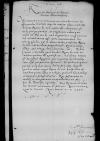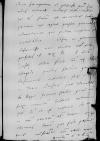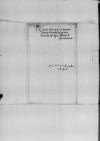 BCz, 1597, p. 951
BCz, 1597, p. 951
Reverendissime in Christo Pater et Domine, domine observatissime.
Officiosam servitiorum meorum commendationem.
De ⌊Alexandro Sculteti⌋ cum ita causam istam cordi esse videam Reverendissimae Dominationi Vestrae, mitto illi citationem. In ⌊urbe⌋ quoque providi, ut supplicatio eadem, quae missa est Reverendissimae D(ominationi) or D(ominationis)⌈D(ominationi)D(ominationi) or D(ominationis)⌉ Vestrae, signaretur neque ⌊viciniori⌋, sed ⌊Wladislaviensi episcopo⌋ causa committeretur.[1] Ita utroque gladio, aut si altero satius videbitur Reverendissimae Dominationi Vestrae, contra ⌊illum⌋ pugnabimus. Erit in manu illius aut utroque, aut alterutro uti.
De domino ⌊Ioanne a Werden⌋ quod ⌊⌋ Reverendissima Dominatio Vestra, voluissem quidem illi gratificari, sed aliter visum est ⌊maiestati reginali⌋, quae in partes domini ⌊Schewka⌋ cum esset propensior, pervicit.
De ⌊fratribus⌋ in optimam partem accipiunt omnia serenissimi ⌊principes⌋ neque est, quod se animi angat Reverendissima Dominatio Vestra. Prospectior est omnibus pietas illius et religio, quam ut delationibus cuiusquam fides habeatur. Haec festinanter in multis et magnis meis occupationibus scripsi. Per dominum ⌊Plotowski⌋ copiosius.
Deus Reverendissimam Dominationem Vestram diu servet incolumem et felicem.
Eiusdem Dominationis Vestrae Reverendissimae servitor ⌊Samuel episcopus Chelmensis et vicecancellarius⌋
Postscript:
 BCz, 1597, p. 949
BCz, 1597, p. 949
Quae hic aguntur, dominus ⌊Plotovski⌋, qui hic rebus interest, rediens declarabit. Haec tamen summa est. ⌊Conventus⌋ hodie primum agi coeptus propter privatas altercationes, quae publica negotia remorabantur.
⌊Caesar⌋ in ⌊Germaniam⌋ descendisse iam dicitur, ad quem profectus est ⌊rex Romanorum⌋. A domino ⌊Laski⌋ allatae sunt litterae ex ⌊Constantinopoli⌋, quibus scribit principibus Christianis indutias sex mensium a ⌊Turco⌋ concessas praeter ⌊Venetos⌋. De ⌊rege Ioanne⌋ scribit, quod non satis amicum habeat ⌊caesarem⌋, sed tamen et ipsi indutiae datae. A nostro ⌊oratore⌋ ex ⌊Turcia⌋ exspectamus litteras pro 1540-03-28⌊festo Paschatis1540-03-28⌋. Quid afferent, non erit incognitum Dominationi Vestrae Reverendissimae.  BCz, 1597, p. 950 ⌊Regia maiestas⌋ iam convaluit in omnibus praeter pedes, nam illis ita uti non potest ut prius. Interdum tamen inambulat et proinde decrevit in ⌊Lituaniam⌋ mox a 1540-03-28⌊festo Paschatis1540-03-28⌋
proficisci. Alia non sunt et, si essent, vix prae meis occupationibus scribi possent.
BCz, 1597, p. 950 ⌊Regia maiestas⌋ iam convaluit in omnibus praeter pedes, nam illis ita uti non potest ut prius. Interdum tamen inambulat et proinde decrevit in ⌊Lituaniam⌋ mox a 1540-03-28⌊festo Paschatis1540-03-28⌋
proficisci. Alia non sunt et, si essent, vix prae meis occupationibus scribi possent.
Iterum me commendo Vestrae Reverendissimae Dominationi.
 BCz, 1597, p. 950
BCz, 1597, p. 950 


